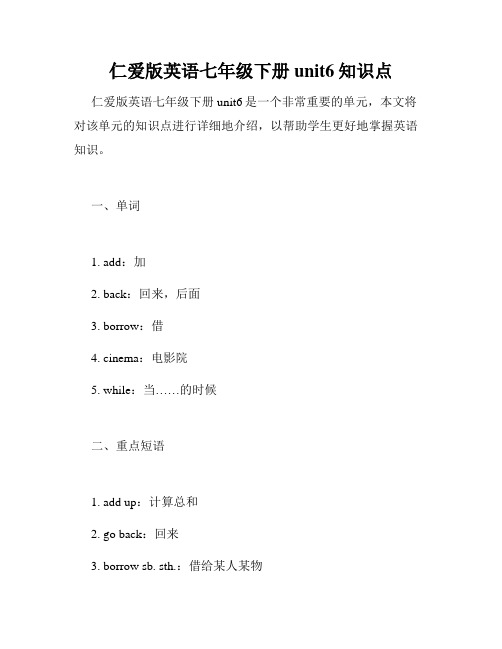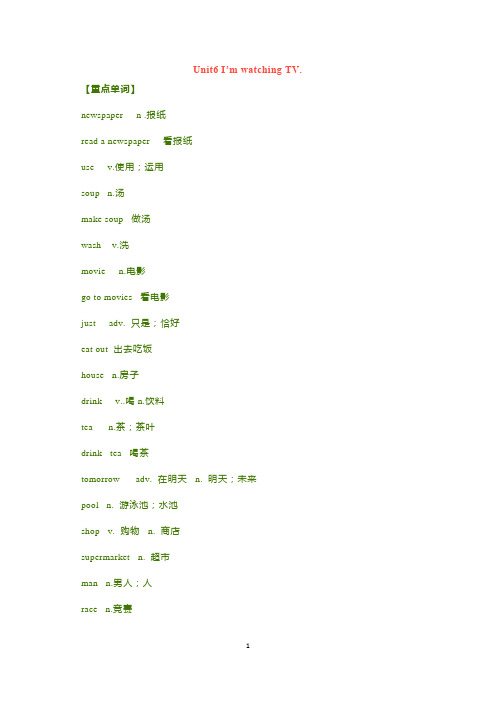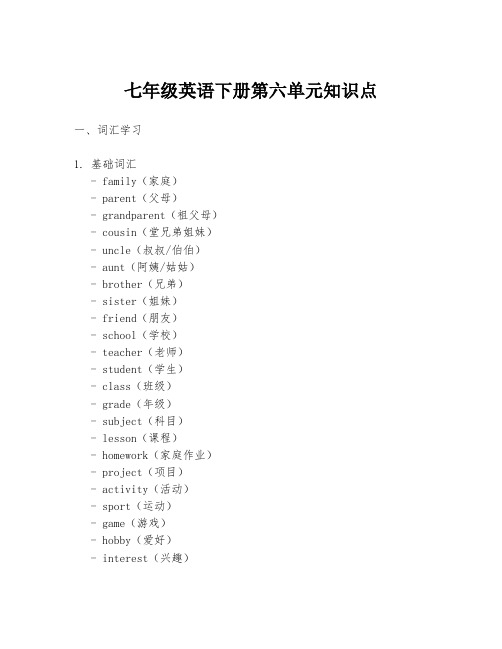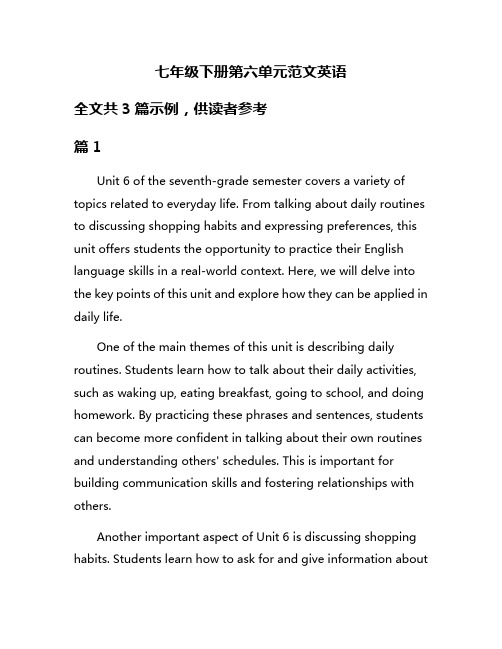七年级(下册)英语第六单元
七年级下册英语第六单元单词

七年级下册英语第六单元单词七年级下册英语第六单元单词涵盖了一些日常生活中常见的词汇,例如服装、颜色、数字等。
这些单词是学生学习英语基础词汇的必备内容,也是日常交流中必不可少的词汇。
下面是本单元的一些重要单词:1. shirt 衬衫2. dress 连衣裙3. pants 裤子4. socks 袜子5. shoes 鞋子6. skirt 裙子7. sweater 毛衣8. jacket 夹克9. color 颜色10. red 红色11. blue 蓝色12. green 绿色13. yellow 黄色14. black 黑色15. white 白色16. gray 灰色17. purple 紫色18. brown 棕色19. orange 橙色20. pink 粉色21. number 数字22. one 一23. two 二24. three 三25. four 四26. five 五27. six 六28. seven 七29. eight 八30. nine 九31. ten 十在学习这些单词时,学生可以通过多种方式来加深记忆和理解。
例如,可以使用图片或卡片来帮助记忆每个单词的意思和拼写。
还可以尝试将这些单词用于日常生活中的实际场景,例如描述自己或他人的服装、颜色和数字等。
此外,学生还可以通过参加一些英语活动和游戏来提高他们的词汇水平。
例如,他们可以与同学或老师一起玩游戏,例如单词接龙、单词拼图或猜谜语等。
这些活动可以帮助学生更加轻松、有趣地学习和掌握这些重要的单词。
仁爱版英语七年级下册unit6知识点

仁爱版英语七年级下册unit6知识点仁爱版英语七年级下册unit6是一个非常重要的单元,本文将对该单元的知识点进行详细地介绍,以帮助学生更好地掌握英语知识。
一、单词
1. add:加
2. back:回来,后面
3. borrow:借
4. cinema:电影院
5. while:当……的时候
二、重点短语
1. add up:计算总和
2. go back:回来
3. borrow sb. sth.:借给某人某物
4. go to the cinema:去电影院
5. while doing:在做……的时候
三、语法
1. There be句型
There be句型表示“有”、“存在”之意,例如:There is a book on the desk.即桌子上有一本书。
2. 句型I'm + doing sth.
这种结构常用来表达我们正在做某件事情,例如:I'm playing basketball. 即我正在打篮球。
四、例句
1. There is a cinema near our school.(我们学校附近有一家电影院。
)
2. I'm studying English while listening to music.(我边听音乐边学英语。
)
3. Can I borrow your pen for a moment?(我可以借用你的笔一下吗?)
总结
通过对仁爱版英语七年级下册unit6的学习,我们了解了很多单词、短语和语法结构。
好的掌握这些知识点,一定会对我们的英语学习帮助很大。
希望大家能够认真学习,并不断提高自己的英语能力。
七年级下册英语书第六单元单词

七年级下册英语书第六单元单词Unit 6 I'm watching TV.一、重点单词。
1. newspaper /ˈnjuːzpeɪpə(r)/ n. 报纸。
2. use /juːz/ v. 使用;运用。
3. soup /suːp/ n. 汤。
4. wash /wɒʃ/ v. 洗。
5. movie /ˈmuːvi/ n. 电影。
6. just /dʒʌst/ adv. 只是;恰好。
7. house /haʊs/ n. 房子。
8. drink /drɪŋk/ v. 喝 n. 饮料。
9. tea /tiː/ n. 茶;茶叶。
10. tomorrow /təˈmɒrəʊ/ n. 明天;adv. 在明天。
11. pool /puːl/ n. 游泳池;水池。
12. shop /ʃɒp/ v. 购物 n. 商店。
13. supermarket /ˈsuːpəmɑːkɪt/ n. 超市。
14. man /mæn/ n. 男人;人(复数men /men/)15. race /reɪs/ n. 竞赛。
16. host /həʊst/ n. 主人;东道主。
17. study /ˈstʌdi/ v. & n. 学习;研究。
18. state /steɪt/ n. 州。
19. the United States 美国;美利坚合众国(the USA)20. American /əˈmerɪkən/ adj. 美国的;美洲的 n. 美国人;美洲人。
21. dragon /ˈdræɡən/ n. 龙。
22. Dragon Boat Festival 端午节。
23. any /ˈeni/ adj. 任何的;任一的;pron. 任何;任一。
24. other /ˈʌðə(r)/ adj. 另外的;其他的;pron. 另外的人(或物)25. young /jʌŋ/ adj. 幼小的;年轻的。
七年级下册人教版第六单元英语知识点

人教版英语七年级下册第六单元知识点如下:单词:1.看电视/电影 watch TV/ watch a movie2.看报纸 read a newspaper3.通过电话交谈 talk on the phone4.听音乐 listen to music5.使用电脑 use the computer6.做汤 make soup7.洗餐具 wash the dishes8.有点儿 kind of9.去电影院 go to the movies10.电视节目 TV show11.在六点钟 at six o’clock12.等待 sb/ sth Wait for sb/ sth13.那听起来不错 That sounds good14.电视新闻 TV news15.在周末 on the weekend16.购物中心 shopping center17.举起,抬起 lift up18.倒掉,倾倒 pour out19.报警 call the police20.报警电话 the police phone number21.消防电话 the fire phone number22.帮助,救援 help, rescue23.伤,受伤 hurt24.丢失,失落 lost25.迷路,迷失 lost way26.希望希望 hope to do sth/ hope that+句子27.想要,需要 want to do sth/ need sth28.谢谢你的帮助 Thank you for your help29.在乡下 in the countryside30.野餐 have a picnic31.湖,湖泊 lake32.在湖边 on the lake33.山,山峦 mountain34.在山顶 on the top of the mountain35.高楼大厦 tall building36.银行 bank37.超市 super market38.公园 park39.自然自然 nature40.电影院电影院 cinema41.剧院 theatre42.书店 book store43.学校 school44.医院 hospital45.大街,街道 street46.邮局 post office47.工厂 factory48.警察局 police station49.超市 super market50.银行 bank51.医院 hospital52.学校 school53.剧院 theatre54.公园 park55.图书馆 library56.购物中心 shopping center57.餐馆 restaurant。
人教版七年级英语下册-Unit 6:知识点总结+单元测试(word版,含答案)

Unit6 I’m watching TV.【重点单词】newspaper n .报纸read a newspaper 看报纸use v.使用;运用soup n.汤make soup 做汤wash v.洗movie n.电影go to movies 看电影just adv. 只是;恰好eat out 出去吃饭house n.房子drink v..喝n.饮料tea n.茶;茶叶drink tea 喝茶tomorrow adv. 在明天 n. 明天;未来pool n. 游泳池;水池shop v. 购物 n. 商店supermarket n. 超市man n.男人;人race n.竞赛host n.主人;东道主study v./n. 学习;研究state n. 洲the United States 美国;美利坚合众国American adj. 美国的;美洲的n. 美国人;美洲人dragon n.龙Dragon Boat Festival 端午节any adj. 任何的,任一的 pron. 任何;任一other adj. 另外的;其他的 pron. 另外的人(或物)young adj. 幼小的,年轻的children n. 儿童miss v.怀念. 思念wish v. 希望delicious adj. 可口的,美味的still adv. 还.仍然living room 客厅【重点短语】1.watch TV看电视2. read a newspaper 看报纸3. talk on the phone 通过电话交谈4. listen to a CD 听CD5. a useful book 一本有用的书6. make soup 做汤7. wash the dishes 洗碟子8. go to the movies 去看电影9. at home 在家10. eat out 在外面吃11. drink tea 喝茶12.Dragon Boat Festival 端午节13. make zongzi 包粽子14. watch the boat races 看龙舟比赛15. the night before the festival 节日前的晚上16. any other night 任何其他的晚上17. his host family 他的寄宿家庭18. read a story to sb 读故事给某人19. miss sb. 思念某人miss doing sth 错过做某事20. wish to do sth希望做某事wish sb to do sth希望某人做某事hope to do sth希望做某事21. no place like home 没有地方像家一样22. in the United States 在美国23. study for a test 为一个考试而学习【重点句型】1.一What are they doing?他们在干什么?—They’re listening to a CD.他们在听光碟。
七年级英语下册第六单元知识点

七年级英语下册第六单元知识点一、词汇学习1. 基础词汇- family(家庭)- parent(父母)- grandparent(祖父母)- cousin(堂兄弟姐妹)- uncle(叔叔/伯伯)- aunt(阿姨/姑姑)- brother(兄弟)- sister(姐妹)- friend(朋友)- school(学校)- teacher(老师)- student(学生)- class(班级)- grade(年级)- subject(科目)- lesson(课程)- homework(家庭作业)- project(项目)- activity(活动)- sport(运动)- game(游戏)- hobby(爱好)- interest(兴趣)2. 动词短语- go to school(上学)- study English(学习英语)- do homework(做家庭作业)- play sports(进行体育运动)- watch TV(看电视)- read books(读书)- listen to music(听音乐)- talk with(与...交谈)3. 常用表达- I have...(我有...)- He/She is...(他/她是...)- They are...(他们/她们是...)- We are in the same class.(我们在同一个班级。
)- My favorite subject is...(我最喜欢的科目是...)- I like to...(我喜欢...)二、语法要点1. 一般现在时- 描述习惯性动作或状态。
- 使用动词原形,第三人称单数时动词要加 -s 或 -es。
2. 代词- 主格代词:I, you, he, she, it, we, they 用于句子主语。
- 宾格代词:me, you, him, her, it, us, them 用于句子宾语。
3. 形容词性物主代词- my(我的)- your(你的/你们的)- his(他的)- her(她的)- its(它的)- our(我们的)- their(他们的/她们的/它们的)4. 名词性物主代词- mine(我的)- yours(你的/你们的)- his(他的)- hers(她的)- its(它的)- ours(我们的)- theirs(他们的/她们的/它们的)5. 介词- in(在...里)- on(在...上)- at(在...处)- with(和...一起)- for(为了)6. 特殊疑问词- Who(谁)- What(什么)- Where(哪里)- When(何时)- Why(为什么)- How(怎样)三、句型结构1. 简单句- 主语 + 动词 + 宾语/状语例如:I go to school every day.(我每天上学。
七年级下册第六单元范文英语

七年级下册第六单元范文英语全文共3篇示例,供读者参考篇1Unit 6 of the seventh-grade semester covers a variety of topics related to everyday life. From talking about daily routines to discussing shopping habits and expressing preferences, this unit offers students the opportunity to practice their English language skills in a real-world context. Here, we will delve into the key points of this unit and explore how they can be applied in daily life.One of the main themes of this unit is describing daily routines. Students learn how to talk about their daily activities, such as waking up, eating breakfast, going to school, and doing homework. By practicing these phrases and sentences, students can become more confident in talking about their own routines and understanding others' schedules. This is important for building communication skills and fostering relationships with others.Another important aspect of Unit 6 is discussing shopping habits. Students learn how to ask for and give information aboutprices, quantities, and preferences when shopping. They also practice using expressions like "How much is it?" and "I would like to buy…" to communicate effectively in a retail setting. By mastering these phrases, students can navigate shopping situations with ease and confidence.In addition to daily routines and shopping habits, Unit 6 also covers expressing preferences. Students learn how to talk about what they like and dislike, as well as how to ask others about their preferences. By using phrases like "I prefer…" and "What do you think of…?" student s can engage in discussions about personal tastes and interests. This can lead to meaningful conversations and the discovery of common interests among classmates.Overall, Unit 6 of the seventh-grade semester offers students a rich and varied learning experience. By practicing daily routines, shopping habits, and expressing preferences, students can develop their English language skills in a practical and engaging way. These skills are not only useful in the classroom but also in everyday life, as they enable students to communicate effectively in a variety of social and professional situations. By mastering the key points of this unit, students can build confidence, improvetheir language proficiency, and enjoy a richer and more fulfilling language learning experience.篇2Unit 6 in the seventh grade textbook covers a variety of topics related to environment and nature. This unit introduces students to key vocabulary words related to the environment, such as pollution, deforestation, and conservation. In addition, students learn about various environmental issues facing the world today, and are encouraged to think about solutions to these problems.One of the key themes in this unit is the concept of sustainability. Students learn about the importance of sustainable practices in order to protect the environment and ensure the well-being of future generations. They are introduced to the idea of the three Rs – reduce, reuse, and recycle – as ways to minimize waste and conserve resources. Through discussions and activities, students are encouraged to think about how they can incorporate these principles into their daily lives.Another important topic in this unit is the impact of human activities on the environment. Students learn about the negative effects of pollution, deforestation, and climate change, and arechallenged to think about ways to address these issues. They are introduced to the concept of environmental conservation, and are encouraged to consider how they can become more environmentally conscious citizens.Overall, Unit 6 provides students with a comprehensive understanding of environmental issues and the importance of protecting the environment. By learning about sustainability, conservation, and the impact of human activities on the environment, students are encouraged to think critically about their own behavior and the ways in which they can contribute to a healthier planet. Through engaging activities and discussions, students are empowered to take action and make a positive impact on the world around them.篇3Non-FictionIn this unit, we have been studying non-fiction texts and learning about different types of non-fiction writing such as informational texts, biographies, autobiographies, and more. Non-fiction texts provide us with valuable information, facts, and real-life stories that help us gain a better understanding of the world around us.One type of non-fiction text that we have explored is an informational text. Informational texts are designed to provide readers with factual information on a particular topic. They are often structured in a way that makes it easy for readers to locate specific information quickly. For example, textbooks, newspapers, and encyclopedias are all examples of informational texts.Another type of non-fiction text that we have studied is a biography. A biography is a non-fiction text that tells the story of a person's life. Biographies provide readers with a glimpse into the lives of notable figures in history, politics, entertainment, and more. By reading biographies, we can learn about the challenges, successes, and experiences that have shaped the lives of these individuals.Autobiographies are another type of non-fiction text that we have examined in this unit. An autobiography is a self-written account of a person's life. Autobiographies offer readers a unique perspective on the author's life, allowing us to gain insight into their thoughts, emotions, and personal experiences.In addition to informational texts, biographies, and autobiographies, we have also learned about other forms of non-fiction writing such as articles, essays, and reports. Thesetypes of non-fiction texts are created to inform, persuade, or entertain readers on a variety of topics.Overall, studying non-fiction texts has been both informative and engaging. By exploring different types of non-fiction writing, we have developed a deeper appreciation for the value of factual information and real-life stories. Non-fiction texts play an essential role in expanding our knowledge and understanding of the world, making them an important part of our reading and learning experience.。
七年级下册第六单元英语单词

七年级下册第六单元英语单词以下是七年级下册英语(人教版)第六单元的单词表:1.Section Arain v. 下雨n. 雨水windy adj. 有风的cloudy adj. 多云的sunny adj. 晴朗的snow v. 下雪;n. 雪weather n. 天气cook v. 煮;烧bad adj. 坏的;糟糕的park n. 公园message n. 信息;消息take a message 捎个口信;传话him pron. 他(he的宾格)could modal v. 可以;能;可能back adj. 回来;回原处soon adv. 不久later adv. 以后;随后hold (held held) v. 举行;进行sport n. 运动all day 整天goodbye int. 再见bye int. 再见(口语)study v. & n. 学习;研究state n. 州American adj. 美国的;美洲的n. 美国人;美洲人2.Section Bsit v. 坐down adv. 向下;在下面cat n. 猫lie v. 躺;平躺on one's back 仰卧stomach n. 胃;腹部sleep v. & n. 睡觉lie on one's stomach 俯卧each pron. 每个;各自other adj. 另外的;其他的leg n. 腿;腿部foot (pl. feet) n. 脚;足football n. 足球then adv. 那么;然后dream n. & v. 梦想;做梦a lot 很;非常;常常even adv. 甚至;愈加last adv. 最后;最近laugh v. 笑;发笑have a good time 玩得高兴at school 在学校be free 有空some day 将来有一天write to 写信给……以上是人教版七年级下册英语第六单元的单词表,涵盖了该单元所有需要掌握的词汇。
- 1、下载文档前请自行甄别文档内容的完整性,平台不提供额外的编辑、内容补充、找答案等附加服务。
- 2、"仅部分预览"的文档,不可在线预览部分如存在完整性等问题,可反馈申请退款(可完整预览的文档不适用该条件!)。
- 3、如文档侵犯您的权益,请联系客服反馈,我们会尽快为您处理(人工客服工作时间:9:00-18:30)。
1. It’s like any other night for Zhu Hui and his host family.对朱辉和他的寄宿家庭来说,今晚和其他任何 一个晚上是一样的。
other
三者或是三者以上的其他人或物
The other 两者中的一个
2. Zhe Hui misses his family and wishes to have his mom’s delicious zongzi.朱辉思念他的家人并希望吃上 他妈妈做的可口的粽子。
__________________________________ __________________________________ __________________________________ __________________________________ __________________________________
1. Why are Zhu Hui’s family watching boat races and making zongzi?
Because today is the Dragon Boat Festival. 2. Does Zhu Hui like his host family? What does he think about his home in China? Yes, he likes his host family a lot. But he thinks that there’s still “no place like home”.
He can play basketball with you.
Bring in some photos of your own (or draw some pictures of you and your family or friends) and write about them. (3b)
These are photos of my family. This is my mother. She’s using the computer. This is my father. He’s watching TV. These are my sisters Jane and Lisa. Jane’s doing her homework and Lisa’s talking on the phone. This is my brother Bob. He’s playing basketball. This is my dog Tina. She’s sleeping. This is me. I’m playing the guitar.
Unit 6 I’m watching TV.
Section B Period Two
活动一,掌握新单词
the United Ston
Dragon Boat Festival
study
living room
delicious
Read the TV reporter and answer the questions below. (2b)
Match the verbs in column A with the words in column B. Then use the phrases to write sentences according to the TV report. (2c)
Zhu Hui is living with an American family in New York. The mother is reading a story to her children.
Zhu Hui’s mother and his aunt are making zongzi.
Zhu Hui is talking on the phone with his cousin in Shengzhen.
Zhu Hui is now studying in the US.
Zhu Hui’s father and his uncle are watching a race on TV.
Look at the pictures and fill in the blanks.
A: Hi, Eric._W__h_a_t_a_r_e_y_o_u__d_o_in__g_n_o_w_? B: _I’_m__r_e_a_d_i_n_g_a__b_o_o_k_. A: Let’s _p_l_a_y_b_a_s_k_e_t_b_a_ll_. B: But this book is really interesting. A:I_s_y_o_u_r_b_r_o_t_h_e_r_r_ea_d_i_n_g_,_t_oo_? (brother, too) B: No, he isn’t. _H_e_’_s_t_a_k_in_g__a_s_h_o_w__e_r_n_o_w_. A: Then what is Peter doing? B: Oh. _H_e_’_s_w_a_t_c_h_i_n_g_T_V__n_o_w___.
wish 动词 Wish sb sth祝愿某人某事 Wish sb to do sth希望某人去做某事 Wish+that 表示难以实现 的愿望
名词 常用复数
Best wishes to you .给你最美好的祝愿
Complete Jim’s letter. (3a)
Dear Bob, Here is a picture of my family. We are all at home now. I am doing my homework. My parents a_r_e__w_a_t_c_h_in_g__T_V_in the living room. My grandfather _is__r_ea_d__in_g__th_e__n_e_w_s_p_a_p_e_r_. My sister _is__ta_l_k_in__g_o_n__ _th_e__p_h_o_n_e_. Jim
doing my homework. My mother is washing the clothes. My father is cleaning the car. My grandma is reading a newspaper. My grandpa is playing chess with his friend.
